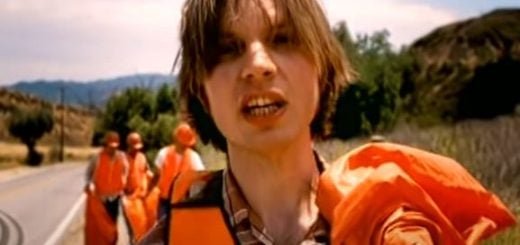Nausea by Beck Lyrics Meaning – A Deep Dive into Beck’s Visceral Anthem of Disorientation
Lyrics
Well I’m a sea-sick sailor on a ship of noise
I got my maps all backwards and my instincts poisoned
In a truth-blown gutter full of wasted years
Like blown-out speakers ringin’ in my ears
Oh, it’s nausea, oh nausea, and we’re gone
It’s nausea, oh nausea, and we’re gone
I’m a straight-line walker with a black-out room
I push a shopping cart over in an Aztec ruin
With my minion fingers working for some god
Who could see his own reflection in a parking lot
Oh, it’s nausea, oh nausea, and we’re gone
It’s nausea, oh nausea, and we’re gone
(Let’s go! Yeah! Hey! Woo-hoo! Say huh! Yahoo! Right on! Woooo! Come on!)
Now I’m a priest teenager on a tower of dust
I’m a dead generator in a cloud of exhaust
In a long-living desert with skulls for my pets
I rate the days, one to ten, with lead cigarettes
Oh, it’s nausea, oh nausea, and we’re gone
Nausea, oh nausea, and we’re gone
When a song captures the cacophony of a generation lost in the static of contemporary life, it begs for a closer examination. Beck, a maestro of blending the abstract with the painfully relatable, delivers a testament to modern disaffection with his track ‘Nausea.’ Taken at face value, the title itself sets expectations for a journey into discomfort, but the song’s true power lies beneath its immediate sensorial implications.
Diving into the psyche behind ‘Nausea,’ one cannot help but sense the swirl of confusion and yearning that propels the lyrics. Beck presents not just a series of images and sentiments, but a prismatic reflection of the human condition amidst a digital and industrial cacophony. Probing deeper, this song is not just about physical revulsion, but a metaphorical interpretation of societal disorientation.
Sonic Chaos as A Mirror to Modernity
The very first verse of ‘Nausea’ confronts the listener with a ‘sea-sick sailor on a ship of noise,’ a powerful metaphor for the overwhelming nature of today’s information and sensory overload. The sophisticated wordplay between ‘maps all backwards’ and ‘instincts poisoned’ suggests a loss of direction and natural response, painting a portrait of an individual hindered by the complexities of current society.
With ‘blown-out speakers ringing in my ears,’ Beck is arguably tapping into the experience of a generation with constant exposure to noise, literal and figurative. The ‘truth-blown gutter’ reeks of disillusionment, a space cluttered with ‘wasted years,’ reminiscent of the post-millennial sense of encountering progress that does not feel like progression.
The Maze of Existential Discontent
Delving into the chorus, the repetition of the word ‘nausea’ drills into the consciousness like a mantra. Beck encapsulates a collective feeling of unease, an embodiment of the song’s title felt in the core. The punctuation of ‘and we’re gone’ serves to underscore the transient nature of experience, or perhaps the desire to escape from the nausea inducing reality.
This existential nausea can be seen as a parallel to the concept articulated by Jean-Paul Sartre, where visceral disquiet reflects the individual’s confrontation with the absurdity and freedom inherent to existence. In this light, ‘Nausea’ is not only a sensory experience but an inevitable encounter with the self in a world where anchors of true meaning seem increasingly scarce.
The Labyrinth of Personal and Universal Struggle
Further exploring the symbolism, Beck juxtaposes contemporary imagery with ancient references, such as a ‘shopping cart over in an Aztec ruin.’ Here, the banality of consumer culture crashes into the sacred antiquity, blending timelines into a single moment of cognitive dissonance. These ‘minion fingers’ hint at a workforce reduced to servitude under an indifferent deity, a reflection on the dehumanization within capitalist structures.
‘Could see his own reflection in a parking lot’—the line resonates with the theme of searching for identity in the mundane, peering into the oil-slick puddles of modernity for a glimpse of self-reflection.
A Taxonomy of Eccentric Verses
Each quirky line peels back another layer of this odyssey through confusion and malaise. ‘I’m a straight-line walker with a black-out room’ could represent the pursuit of purpose within a void of uncertainty. Beck’s ability to lace his lyrics with multi-layered significance invites ruminations on navigating life’s opacity with the fragile compass of our convictions.
The song’s third verse navigates through even more peculiar imaginations with ‘a priest teenager on a tower of dust’ and ‘a dead generator in a cloud of exhaust.’ These juxtapositions of youth and decay, sacred duties and pollution laden landscapes, are vivid brushstrokes on Beck’s canvas of contemporary breakdown.
Chasing Memories in the Echoes of ‘Nausea’
Listen closely to the song’s atmosphere and the instruments tell a story just as intricate as the lyrics. The gritty, pulsating rhythm embodies the industrial grind overlaying the cries of a soul caught in its gears. Beck’s voice navigates through the melody with a detached solemnity, acknowledging the inescapable ‘Nausea’ while hinting at a grim acceptance.
The memorable lines shepherd the listener through an introspective journey, one where every echo and riff resonates with the consciousness of disconnection and the perpetual hunt for clarity amid the fog of the everyday. ‘Nausea,’ through its repetition and raw energy, becomes an auditory landmark for those identifying with the vertigo of contemporary life.








